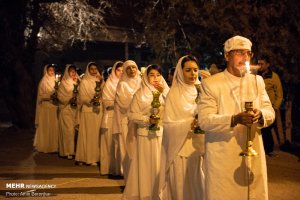
On October 6, when the Nobel Committee awarded Narges Mohammadi the Peace Prize in absentia, she was serving 12 years of multiple prison sentences for her public opposition to the Islamic Republic of Iran.
In a message read by her 16-year-old daughter Kiana and shared on the Nobel Prize website, Mohammadi stated she refuses to wear a hijab, despite the suffering this has caused her, because the law requiring its use is a “means of control and repression imposed on society and on which the continuation and survival of this authoritarian religious regime depends.”
A month after receiving her award, on November 6, she began the next chapter in her campaign: A hunger strike.
Mohammadi, 51, suffers from heart and lung conditions and her family stated she was in urgent need of hospital care, but authorities refused to allow her to be transported to a hospital unless she wore a hijab.
The head of the Nobel Committee expressed profound concern about Mohammadi’s plight. “The requirement that female inmates must wear a hijab in order to be hospitalized is inhumane and morally unacceptable,” said Norwegian Nobel Committee chair Berit Reiss-Andersen.
Between October 29 and 30, Mohammadi and a cohort of women detained in Iran’s Evin prison demonstrated against the prison authorities’ refusal to allow her hospital care, according to a November 1 statement.
On November 8, Mohammadi ended her strike after authorities permitted her to be transported to the hospital—without the required hijab—for needed medical care.
Mohammadi has faced more than a dozen arrests and this is the third time she has been imprisoned since 2012.
She received her Nobel Prize following months of protests throughout Iran that have been brutally crushed by authorities, resulting in the deaths of more than 500 protesters and the detention of nearly 20,000 more.
The demonstrations were sparked by the September 2022 death in custody of Mahsa Amini, a 22-year-old Kurdish-Iranian woman who was detained by Iran’s morality police for not wearing a hijab.
In her message to the Nobel Committee on receiving her award, Mohammadi said, “I was a 19-year-old girl when I was detained because of wearing an orange coat. At the detention center, breathless with disbelief, horror and shock, I saw grim-looking men in black uniforms with whips in their hands who relentlessly lashed the bodies of four women among tens of other detainees.”
“I hereby declare that the Islamic Republic imposes compulsory hijab not out of concern for religious obligations, nor for the sake of social customs and traditions, nor, as it claims, to preserve the dignity and prestige of women. Rather, it is for the purpose of suppressing and controlling women and for extending that control to the entire society.”
From its beginnings, the Church of Scientology has recognized that freedom of religion is a fundamental human right. In a world where conflicts are often traceable to intolerance of others’ religious beliefs and practices, the Church has, for more than 50 years, made the preservation of religious liberty an overriding concern.
The Church publishes this blog to help create a better understanding of the freedom of religion and belief and provide news on religious freedom and issues affecting this freedom around the world.
The Founder of the Scientology religion is L. Ron Hubbard and Mr. David Miscavige is the religion’s ecclesiastical leader.
For more information, visit the Scientology website or Scientology Network.


